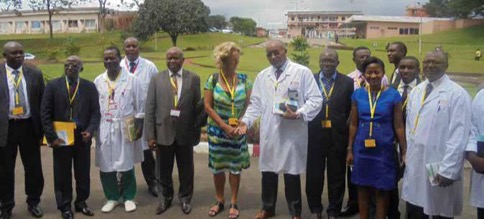There is a huge need for health research to support contextually relevant health service and policy solutions to better the health of populations in sub-Saharan Africa. This need contrasts with the very timid engagement of healthcare practitioners in research in the region.
It is against this background that the Douala General Hospital (a tertiary care hospital in Cameroon), under the stewardship of its chief executive officer, organised the first annual scientific and research day in October 2014. This maiden event saw the participation of local research leaders and the eminent director of the South African Hatter Institute for Cardiovascular Research in Africa, who co-chaired the event.
The aim was to educate students, clinicians and junior researchers on the importance of clinical research and evidence-based medicine around the leading theme of the event: action for clinical research and good medical practice.
Several abstracts were presented, covering various aspects of medicine, including cardiology, rheumatology, paediatrics, pulmonology, HIV medicine, and obstetrics and gynaecology, together with key lectures on cardiac disease and pregnancy, and plenary sessions on research methodology, scientific writing and publishing. It is hoped that this event will enhance clinical research and the dissemination of research findings to improve evidence-based clinical practice in the country.
Clinical research in sub-Saharan Africa (SSA) is very daunting due to the combined effects of many factors, including the timidity for, or lack of interest of clinicians in research, the absence of adequate infrastructure for the conduct of clinical and experimental research, a structured health system that is not conducive to research, as well as funding constraints.1 In order to foster good clinical practice and evidence-based medicine, executives of the Douala General Hospital (DGH), which is a referral hospital for Cameroon and central Africa, initiated the annual research and scientific day and organised the maiden event on 2 October 2014.
The technical organisation was done by experts from the Clinical Research Education, Networking and Consultancy (CRENC), and the Cameroon Cardiac Society, and they were advised by the Pan-African Society of Cardiology.
The main theme of this conference was an action for clinical research and good medical practice. This event brought together over 200 participants, including general practitioners, surgeons, obstetricians, cardiologists, endocrinologists, specialist physicians in training, undergraduate medical students and medical researchers. It was co-chaired by Prof Karen Sliwa-Hahnle, director of the Hatter Institute for Cardiovascular Research in Africa (HICRA), University of Cape Town, South Africa, who is also director of the Soweto Cardiovascular Research Unit, University of Witwatersrand, South Africa. Her participation was in line with her vision, plans and commitment for health research in Africa, as reflected in this quote from her on that day: ‘We know the major problems of cardiovascular disease on the continent. What we need are the solutions, not further documentation of the problems of hypertension, obesity and related lifestyle factors’.
There is no doubt that Prof Sliwa Hahnle’s presence in Cameroon on this occasion gave an additional flavour to the event.2 The conference was enlightening, with a session for abstract presentations (orally and by poster), followed by plenary sessions on cardiac disease and pregnancy, research methodology, ethics and research in Cameroon, and the art and impact of scientific writing and publishing. Finally, awards were given for the best abstracts.


Full Publication here: https://www.ncbi.nlm.nih.gov/pubmed/25629543


